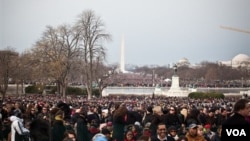In keeping with the U.S. Constitution, Barack Obama’s second term as president of the United States officially began Sunday, when he was sworn in at a private ceremony in the White House.
Monday’s public ceremony, however, brought the pomp and circumstances that Americans and observers around the world typically associate with the start of a presidency. After being sworn in by the Chief Justice of the Supreme Court, President Obama gave a brief speech.
Other events of the day include the singing of patriotic songs by celebrities, a presidential parade through Washington, and an Inaugural Ball in the evening.
Mr. Obama’s first inauguration in 2009 brought more people to any event ever in Washington DC, attracting a record-breaking 1.8 million attendees. Estimates of the crowd at this second inauguration were smaller than at the first, but still an impressive 800,000 or more.
Studio 7’s Blessing Zulu was at the Capitol lawn during the events and said the crowd seemed particularly excited by the arrival of President Obama, his family, and former Presidents Bill Clinton and Jimmy Carter.
President Obama’s speech was remarkably short, only about 11 minutes longHe pledged progress on the economy and a host of domestic issues, but also spoke about America’s role in advancing democracy around the world.
“We will support democracy from Asia to Africa,” Mr. Obama said, “from the Americas to the Middle East, because our interests and our conscience compel us to act on behalf of those who long for freedom.”
While many countries around the world today enjoy a peaceful transition of power following national elections, Presidential Inaugurations in the United States began as a ceremony to help ensure that there was a transition.
Speaking before the president at the Inauguration, Republican and former US Senator Lamar Alexander quoted America’s first president, George Washington, as saying that his own election was far less significant than that of his successor.
“Our first president, George Washington, once posed this question: ‘What is most important,’ Washington asked, “in this grand experiment, the United States?’ And then Washington answered his own question in this way: ‘Not the election of the first president, but the election of its second president.’ The peaceful transfer of power.”
The United States Constitution stipulates that the president be inaugurated on January 20 of the year following an election. When the 20th falls on a weekend, the president is sworn in privately, with a public ceremony repeating the following Monday.















